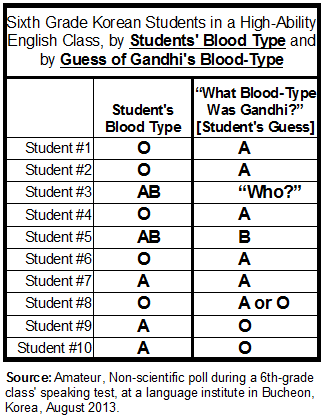Here is how I understand it:
- Blood Type A: Careful and hardworking but shy; internally nervous and worried about others.
- Blood Type B: Fun-loving and charismatic, but unpredictable and can be rude, selfish, and/or lazy.
- Blood Type O: Sociable (can be over-sociable), optimistic, and a natural leader.
- Blood Type AB: Serious, smart and able, but aloof and eccentric.
I occasionally discuss this theory with students, and it’s always a winning strategy. They are “into” it.
This past week there was a speaking test, probably the last one I will give here. We had been studying “personalities” in the text-book, so I decided to make both the speaking and writing tests about personality. In the speaking test, I asked all ten students various questions, one of which was “what is your blood-type?” Because of this blood-type belief, everyone knows his or her own type. I then asked them to consider what Gandhi’s blood-type may have been (he was in the textbook), and explain why they thought so. I noted their answers. I thought this would, somehow, give me some kind of insight into Blood Type Theory. This little graphic I made shows the results:
Notes
- “Methodology”: I asked each student this question individually, as part of their speaking test, in a separate room. That is, they were each alone with me in the testing place, one by one. It was also a surprise question. There is no way they were influenced by other students’ answers to this “Gandhi question”.
- Student #3: [born Sept 2001] This is a girl who has spent a few months in California, and who sounds, sometimes, ever-so-slightly like a “Valley Girl”. She claimed to not know who Gandhi was. I said he was from India. She said “Really?!” She is AB. She was the only student who claimed to not be familiar with Gandhi, which fits in with the “eccentric” idea for AB people.
- Student #8: [born July 2001] This is a girl who attends an International School in China. She is back in Korea on summer vacation. She will leave soon, because vacation is ending. She reported that she was Type O, but she also said that she was “half B” (meaning her actual blood is O, but she has some B characteristics). This surprised me because I think she is a clear “A”, quiet and hardworking!
- Student #9: [born April 2001] This is the bright boy who is a fan of dinosaurs, whom I have written about before. He is the only student who thought Blood Type Personality Theory was wrong. He was insistent that it is not true, but even he was very aware of the ideas of it.
Summary of Results
- Students with blood type A thought that Gandhi was type O by a 2-to-1 margin.
- Students with blood type O thought that Gandhi was type A by a 5-to-0 or 4-to-1 margin (#8’s double-answer).
- Students with blood type ‘AB’, suitably to the stereotype, gave the only two oddball answers. That is to say, they gave the only two non-A, non-O responses. One girl said ‘B’, and the other was Student #3 (see above).
Simply:
A’s guessed “O”.
O’s guessed “A”.
I wonder what this means. There is clearly some following of cultural expectations going on. Maybe it means these kids don’t want to see themselves as “like Gandhi”, for some reason. People who see themselves as “O” may be playing-up Gandhi’s supposed nonviolence (“A” would be the least violent of any type). People who see themselves as “A” may want to play-up Gandhi’s leadership (an “O” trait). Maybe, then, in heroic figures, we look for what’s lacking in ourselves.
I’m open to better explanations.
********************
Related Posts
Post 64: “Refusing a Nickel“
Post 7: “Nobody Wants Robot Teachers”
Post 8: “Robot Supporter Demographics“


Everybody, except Student #7, thinks Gandhi is not like themselves. Or to put it another way, they are not like Gandhi.
What type would practice non-violent civil disobedience?
Ask students to figure blood type of their teacher. Explain.
Or if they could be another type, what would it be. Explain.
Either students don’t want to see themselves like Gandhi because Gandhi is bad (admirable but seems weak/uncool, being so thin and bespectacled and all), OR because the students see themselves as bad (not as good as the great Gandhi). I don’t know which it is. Maybe both.
“What type would practice non-violent civil disobedience?”
Nonviolence would appeal most to ‘A’, I think. Civil Disobedience, I’m not so sure.